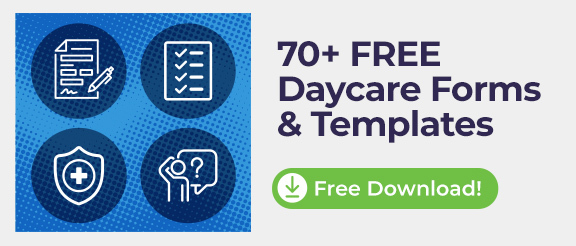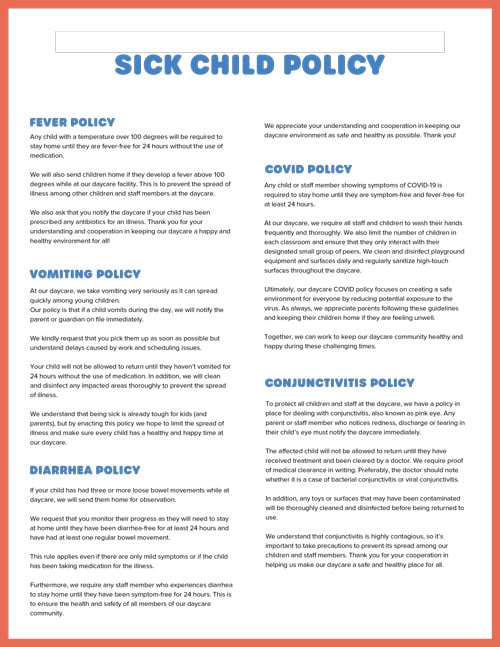As a daycare provider, it's important to have a daycare sick child policy in place. It protects the health of all the children in your care and protects their families and the staff at your daycare.
When a child who is exhibiting symptoms of illness attends daycare, they can easily spread their germs to the other kids and anyone they come into contact with. This puts everyone at risk of getting sick and can result in extended absences and increased health care costs.
By implementing a daycare sick policy, you're taking proactive steps to prevent the spread of illness and promoting a safe and healthy environment for all involved.
So make sure you have a clear policy in place for when parents should keep sick children home. Include it on your daycare center’s website and make it easy to find and view. Everyone from your staff to the little ones will thank you for it.
Not sure where to get started in creating a comprehensive daycare illness policy? Use these tips and templates.
Table of Contents
- Check Official State Policies
- CDC Recommendations for Sick Child Care
- Understand Sick Care Policy Terminology
- When to Keep Kids Out of Daycare
- Free Daycare Sick Child Policy Templates
- Other Policies to Consider for Your Daycare
- Where to Upload Sick Child Policies
Check Official State Policies
Before creating a daycare sick child policy from scratch, it’s helpful to first check your local or state government websites. Understand what your state requires in terms of licensed childcare centers.
For example, the Texas Administrative Code currently doesn’t allow licensed childcare centers to allow ill children to attend their daycare facilities if:
- The illness prevents them from comfortably participating in activities (including outdoor play)
- The illness requires caregivers to give them more care than they’re able to without compromising the health, safety and care of other children
- The child has a fever (temperatures qualifying as a fever vary based on the method) accompanied by behavioral changes
Likewise, the State of Minnesota doesn’t allow childcare program providers to accept sick children into their facilities if the child exhibits these symptoms or illnesses:
- Chickenpox
- 100-degree fever or above
- Undiagnosed rash
- Unexplained lethargy
- Lice, ringworm or scabies
- Other common illnesses that are determined to be contagious
In both states’ rules, the conditions are somewhat objective. However, it pays to do some research before creating your daycare illness policies. It give you a good understanding of your state requirements and help you determine what to include in your policy.
CDC Recommendations for Sick Child Care
If you’re ever in doubt about what to include in your sick policy and what to leave out, it’s helpful to check CDC recommendations. Currently, the CDC recommends the following:
School systems, including childcare centers, should implement a core set of infection prevention strategies to protect the young students they teach and take care of.
K-12 schools and ECE programs are vital parts of our society. Therefore, they must maintain healthy environments where children feel safe and adults can promote equity in learning and health.
This very broad recommendation helps you understand the importance of implementing a daycare sick child policy. Remember that your job is to protect and care for children.
By implementing a daycare sick policy, you can help promote positive learning and play environments where all children can thrive. At a minimum, you should be ensuring parents and children understand how to keep your daycare space healthy.
This includes having them follow common health tips such as:
- Washing their hands frequently
- Screening for fever or illness if their child looks sick
- Cleaning and disinfecting clothes and belongings
- Covering coughs and sneezes
- Postponing gatherings with sick family members
- Wearing a mask when sick
In some cases, incorporating these personal health safety tips into a lesson plan or daycare activity can help encourage children to care for themselves as they grow and learn.
Understand Sick Care Policy Terminology
Before creating your daycare sick policy, it helps to understand some common illness policy terms. The best way to do this is to read other sick policies from schools and daycare centers in your state or local area.
One of the most common terms you’ll see is exclusion policy. An exclusion policy in a daycare illness policy refers to when a child needs to be kept at home. Basically, it’s what we’ve been talking about.
Generally speaking, it includes situations where the child has a contagious illness or injury and could potentially spread it to other children. For instance, if a child has a fever or vomiting, they should likely be excluded until they have been symptom-free for 24 hours.
While exclusion may seem strict to parents in need of a daycare or an after-school childcare program so they can work, it’s ultimately for the health and safety of all the kids in the daycare.
Of course, exclusion policies can vary from daycare to daycare, so be sure to come up with a policy that makes sense for your center. But when in doubt, err on the side of caution and urge parents to keep their little ones at home until they are feeling better.
When to Keep Kids Out of Daycare
As a general rule of thumb, any exclusion policy for a great daycare facility should include some standard sub-policies. This includes, at a minimum, a daycare diarrhea policy, a fever policy and a vomiting policy.
Let parents know that in general, regardless of the illness, if their child isn’t feeling well, they should stay home and rest until they fully recover. But even when they seem healthy, there are a few red flags to watch out for, including the sub-policies mentioned above. Common serious symptoms of an infectious illness include:
- Fever
- Rash or infection
- Diarrhea
- Vomiting
Your daycare sick child policy should advise parents to keep their children at home until those symptoms clear up. This helps prevent the spread of illness at the daycare and ensures that their children aren't too uncomfortable or distracted to participate in activities.
We’ll explore some policy templates below, but it’s helpful to know exactly what each policy means so you can customize your own.
What Is a Fever Policy?
A daycare fever policy is a set of guidelines for dealing with fever in children. This typically includes having parents take their child's temperature to determine whether or not they can attend daycare that day.
A common fever policy is to exclude a child from the daycare if their temperature is over 100 degrees Fahrenheit, as fever can be contagious and may indicate a more serious illness.
The fever policy may also include instructions for contacting parents if a child develops a fever while they’re at daycare. In that case, the policy should detail how parents will be contacted and how they can pick up their child.
What Is a Vomiting Policy?
While vomiting isn’t always a sign of a serious or even infectious illness, no child should have to attend daycare if they’re feeling sick enough to throw up. This is why it’s so common to see vomiting policies at most childcare facilities.
If a child vomits at daycare, you should notify their parent or guardian immediately and ask that they come to pick up their child as soon as possible. You should then isolate the child from the other children until they can be picked up.
Most importantly, you should clean and disinfect any areas that have been vomited on thoroughly to prevent the spread of any illness.
What Is a Diarrhea Policy?
While it might seem harmless, diarrhea in children can be a serious issue. It can lead to cramps and dehydration that can affect their organs. This is why it’s important to notify parents if a child develops diarrhea at your daycare facility.
Likewise, because children with diarrhea require more attention, care and fluids than healthy children, it’s best to create a daycare diarrhea policy. This will ensure parents don’t send their sick children to your facility and end up making their condition worse.
If a child has diarrhea (defined as having at least three loose or watery stools in one day), they need to stay home until they've been diarrhea-free for 24 hours without the use of medication.
What Is a COVID Policy?
Finally, it’s important to include a COVID policy in your daycare sick child policy. At the very least, you should provide parents with COVID guidelines so they know what to do if their child exhibits symptoms or tests positive.
COVID policies at daycares can vary, but the main goal is to keep both staff and children safe. This often includes daily temperature checks for both staff and children, frequent disinfecting of all surfaces and toys and staggered drop-off and pickup times to limit contact between families.
Some daycares may also require all adults and children to wear masks while on premises or limit visitors, such as parents or volunteers.
COVID policies are constantly evolving as new information about the virus becomes available. We’re at a different point now than we were two years ago. Daycare staff needs to stay up to date on recommended guidelines from organizations like the CDC.
Ultimately, COVID policies at daycares are aimed at protecting the health of everyone involved.
Free Daycare Sick Child Policy Templates
Now that you know all about what each type of daycare sick policy should include, you’re ready to personalize your policies for your childcare facility. Here are some free daycare illness policy templates you can use. Download the free editable template below. To make adjustments, simply enter your information where needed! You can also copy and paste the text below into your own document and make changes
Fever Policy
Any child with a temperature over 100 degrees will be required to stay home until they are fever-free for 24 hours without the use of medication.
We will also send children home if they develop a fever above 100 degrees while at our daycare facility. This is to prevent the spread of illness among other children and staff members at the daycare.
We also ask that you notify the daycare if your child has been prescribed any antibiotics for an illness. Thank you for your understanding and cooperation in keeping our daycare a happy and healthy environment for all!
Vomiting Policy
At our daycare, we take vomiting very seriously as it can spread quickly among young children.
Our policy is that if a child vomits during the day, we will notify the parent or guardian on file immediately. We kindly request that you pick them up as soon as possible but understand delays caused by work and scheduling issues.
Your child will not be allowed to return until they haven’t vomited for 24 hours without the use of medication. In addition, we will clean and disinfect any impacted areas thoroughly to prevent the spread of illness.
We understand that being sick is already tough for kids (and parents), but by enacting this policy we hope to limit the spread of illness and make sure every child has a healthy and happy time at our daycare.
Diarrhea Policy
If your child has had three or more loose bowel movements while at daycare, we will send them home for observation.
We request that you monitor their progress as they will need to stay at home until they have been diarrhea-free for at least 24 hours and have had at least one regular bowel movement.
This rule applies even if there are only mild symptoms or if the child has been taking medication for the illness.
Furthermore, we require any staff member who experiences diarrhea to stay home until they have been symptom-free for 24 hours. This is to ensure the health and safety of all members of our daycare community.
We appreciate your understanding and cooperation in keeping our daycare environment as safe and healthy as possible. Thank you!
COVID Policy
Any child or staff member showing symptoms of COVID-19 is required to stay home until they are symptom-free and fever-free for at least 24 hours.
At our daycare, we require all staff and children to wash their hands frequently and thoroughly. We also limit the number of children in each classroom and ensure that they only interact with their designated small group of peers. We clean and disinfect playground equipment and surfaces daily and regularly sanitize high-touch surfaces throughout the daycare.
Ultimately, our daycare COVID policy focuses on creating a safe environment for everyone by reducing potential exposure to the virus. As always, we appreciate parents following these guidelines and keeping their children home if they are feeling unwell.
Together, we can work to keep our daycare community healthy and happy during these challenging times.
Conjunctivitis Policy
To protect all children and staff at the daycare, we have a policy in place for dealing with conjunctivitis, also known as pink eye. Any parent or staff member who notices redness, discharge or tearing in their child's eye must notify the daycare immediately.
The affected child will not be allowed to return until they have received treatment and been cleared by a doctor. We require proof of medical clearance in writing. Preferably, the doctor should note whether it is a case of bacterial conjunctivitis or viral conjunctivitis.
In addition, any toys or surfaces that may have been contaminated will be thoroughly cleaned and disinfected before being returned to use.
We understand that conjunctivitis is highly contagious, so it's important to take precautions to prevent its spread among our children and staff members. Thank you for your cooperation in helping us make our daycare a safe and healthy place for all.
Cough Policy
While we understand that coughing comes with a common cold, coughs are an important part of our daycare sick child policy. If your child exhibits symptoms of a persistent hacking cough, we kindly request that you keep them at home.
Your child is allowed to return to daycare after 24 hours of being symptom-free. We do, however, require them to return with a doctor’s note. The doctor should indicate the cause of the cough and whether or not it’s contagious.
We understand that keeping your child home means lost income for working parents and missed daycare for your little one, but trust us when we say it's for the best.
Lice Policy
We ask that all parents check their child's hair at least once a week and notify the daycare if they suspect any lice or nits. We also do spot-checks during nap time and before sending children home.
If lice are found, we will notify all parents and work with the infected child's family to treat the issue. The child will not be able to return to daycare until all lice and nits are eliminated. Thank you for helping us keep our daycare a lice-free environment!
Other Policies to Consider for Your Daycare
Aside from the standard daycare illness policies mentioned above, there are other policies you might want to consider adding to your facility’s handbook. Here are three common policies other childcare programs often include.
Common Cold Policy
At daycare, we know that the cold season can be rough for both parents and kids. To keep everyone as healthy as possible, we have a daycare common cold policy in place.
If your child is sick with a fever, cough, runny nose or other symptoms of a cold, please keep them at home until they are feeling better. If your child shows signs of sickness while at daycare, we will assess their situation on a case-by-case basis.
We don’t like to send children home unless they are exhibiting signs of a contagious illness or fever. We know that a common cold is almost inevitable in an environment with lots of young children, but we do our best to prevent the spread of any germs or illnesses.
Medication Administration
When it comes to daycare medication administration, safety is our top priority. We have a strict policy in place to ensure that all medications are properly stored and administered to the correct child at the right time and dosage.
All medications must be:
- Brought in their original packaging
- Labeled with the child's name
- Include the physician's instructions
We also require that parents or guardians sign a consent form before sick children are administered medication. Only staff members who have completed proper training and certification will handle medications.
In addition, we keep detailed records of all medication administration for each child. Our daycare medication administration policy may seem strict, but it's necessary to keep your little ones safe and healthy while they're in our care.
Sick Child Pickup
When it comes to sick kids, one thing is for sure: we want them to get better ASAP. That's why we have a sick child pickup policy in place.
If your child shows any sign of illness, such as a fever, vomiting or diarrhea, they will be separated from the other children. We’ll contact the listed parent or guardian right away for immediate pickup.
No sick child will be allowed to remain on-site until their symptoms clear up. We know it can be tough for you to have to leave work unexpectedly, but the safety and well-being of our children are always our top priority.
Please keep your child’s emergency contact information updated. Know that we'll always do our best to get your little one home as quickly as possible so you can care for them.
Where to Upload Sick Child Policies
Now that you’ve created a stellar daycare sick child policy, what should you do with it? We recommend printing a copy of your comprehensive policy. Include it in an enrollment packet for all new children and families or at the start of each school year.
However, the most convenient option is to keep it on your daycare website in a parent resources section. Make it as accessible as possible. For example, when parents go to pay their fees online, they should be able to see an updated version along with other important information.
This way, parents can easily access the policy whenever they have questions or concerns.
No matter where you choose to post your daycare sick policies, make sure they are easy for everyone to access and understand. This ensures a smoother process for handling illness in the daycare setting.
Get 70+ Editable Daycare Templates for Almost Every Situation
 We know daycare providers like yourself are busy. That's why we made dozens of templates to help you manage the various aspects of your organization. From billing and invoicing to marketing materials, we have it all. Download all 70 today!
We know daycare providers like yourself are busy. That's why we made dozens of templates to help you manage the various aspects of your organization. From billing and invoicing to marketing materials, we have it all. Download all 70 today!













